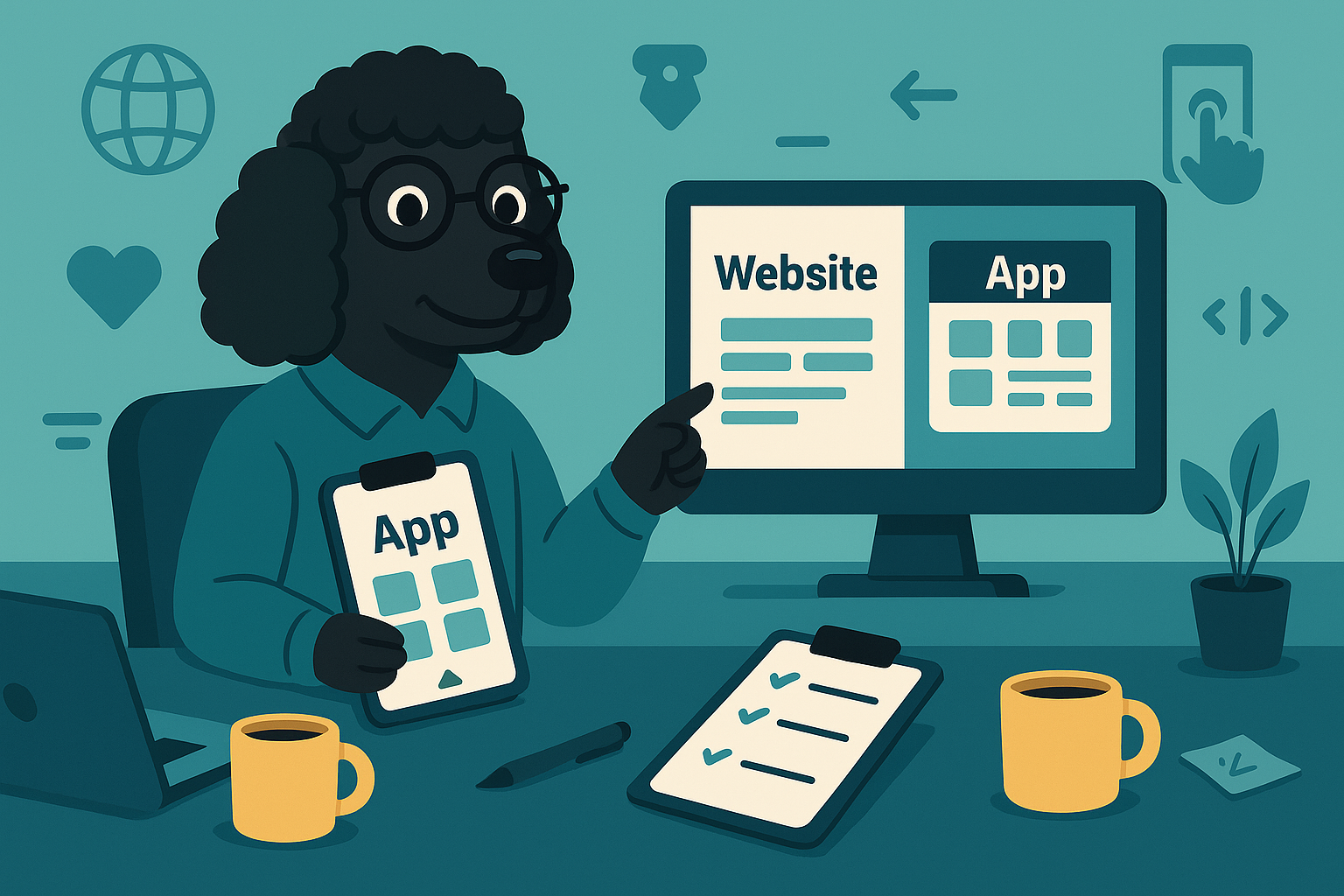Website vs App: What’s the Difference and Which Do You Need?
Website or app — which is right for you? Compare features, costs, and benefits to make the smart choice for your business.

Estimated reading time: 4 minutes
If you’re launching a digital product or online presence, you may ask: “Do I need a website or an app?”
This is a commonly asked question and is important to consider.
Websites and apps serve different purposes and offer unique experiences.
Here we will explain:
- The core differences between a website and an app
- The pros and cons of each
- Which one is right for your goals
So, let’s get started.
What’s the Difference Between a Website and an App?
| Website | App | |
| Accessed Via | Web browser (Chrome, Safari, etc.) | Download via App Store / Play Store or use in browser (Web App) |
| Device compatibility | Responsive across all devices | Built for specific platforms (iOS, Android, desktop) |
| Installation required? | No | Yes (mobile apps) or optional (web apps) |
| Development complexity | Generally Simpler | Typically more complex and expensive |
| Best for | Content, marketing, lead generation, ecommerce | Functionality-heavy experiences (tools, platforms, games) |
What Is a Website?
A website is a collection of pages hosted on the internet that can be accessed through any web browser.
They’re ideal for:
- Marketing your business
- Displaying information
- Selling products (ecommerce)
- Publishing blogs, portfolios, or company updates
Websites are quick to build, easy to maintain, and effective for SEO.
Most small businesses and startups start with a website.
What Is an App?
An app, or application, is software designed for a specific platform, such as iOS, Android, or even a web browser.
Apps are ideal for:
- Interactive tools (like fitness trackers or budget planners)
- Platforms with user logins, messaging, or push notifications
- Custom workflows, such as booking systems, loyalty programs, or SaaS dashboards
Building an app costs more, but gives more control over function, speed, and offline use.
Pros and Cons: Website vs App
Website Pros
- Easier and cheaper to build
- Works across all devices with no install
- Easy to update and maintain
- Great for SEO and discoverability
- Ideal for content marketing and sales funnels
Website Cons
- Limited offline access
- Can’t access device features (like camera or GPS) directly
- Websites may not be as quick or interactive as apps in certain situations.
App Pros
- Optimised user experience for mobile
- Works offline (native apps)
- Can access device features like notifications, camera, and GPS
- Better for complex tools and repeated usage
App Cons
- Requires separate development for each platform (iOS/Android)
- Users must download and install
- More expensive and takes more time to build and maintain
- Getting approval from app stores can slow down your launch.
When Should You Choose a Website?
Choose a website if you want to:
- Launch a brochure site or online presence for your brand.
- Build a marketing funnel for lead generation.
- Sell products with WooCommerce or Shopify.
- Share blogs, news, or portfolios
- Get found on Google (SEO)
Most businesses start with a website because it’s affordable, easy to launch, and effective.
When Should You Build an App?
Consider an app if you:
- Want to offer a tool or platform that requires login access.
- Need users to interact daily or use the tool repeatedly.
- Want to send push notifications or use mobile features.
- Are launching a product like a game, marketplace, or fitness tracker
- Need complex, custom functionality beyond standard CMS options.
If your main goal is to provide a product rather than just promote your business, choosing an app is often the better option.
What About Web Apps?
A web app is an interactive piece of software that you access through your internet browser. Unlike a basic website that only displays information, a web app lets you perform tasks like creating accounts, saving work, or managing projects all within the browser. Web apps do not require downloads but provide functionality much like apps on your phone or computer.
Think of:
- Project management tools (e.g. Trello)
- Email platforms (e.g. Gmail)
- Online dashboards, calculators, portals
Web apps are usually less expensive to build than native mobile apps, but they offer more advanced features and interactivity than typical websites. Web apps enable users to complete tasks, interact with data, and enjoy experiences similar to mobile apps, all without any downloads or installations.
Final Thoughts: Website or App?
There isn’t a single answer that works for everyone.
But here’s a quick rule of thumb:
| To market your services or to sell online | Website |
| To offer a content rich experience | Website |
| To build a platform or a digital tool | App or Web App |
| To leverage mobile device features | App |
| To stay visible in Google search | Website |
| To provide interactive or logged-in user experiences | App or Web App |
If you are thinking of going ahead with a website, take a look at our Complete Website Planning Checklist. To keep on top of the latest development news, take a look at @poodle_collective.
